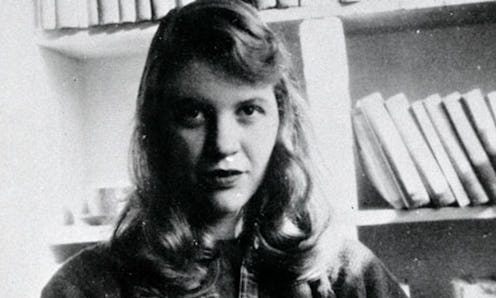Books
Sylvia Plath's Daughter Speaks Out About Her Death

Even people who don't read poetry know the name Sylvia Plath — and know that she committed suicide by putting her head in the oven. Now, Sylvia Plath's daughter Frieda Hughes says that she takes strong issue with the number of people who think that they know more about her mother and her mother's death than even the people closest to her. In one of her first ever public statements on the subject, she takes particular issue with feminists who use Plath's death to further their own agenda.
If you're not already familiar with her work, Sylvia Plath was an American poet and novelist whose work is still read and held in high esteem today. She was a pioneer in confessional poetry, and her classic semi-autobiographical novel The Bell Jar is like a young woman's Catcher In The Rye. She was also clinically depressed for most of her life.
Plath was married to British poet Ted Hughes, and the couple had two children, Frieda, and her younger brother Nicholas. They separated in 1962 over Hughes's infidelity. In 1963, at the age of 30, Plath committed suicide. She and Hughes were still legally married, meaning he inherited her estate, giving him control of her unpublished writings. Hughes was criticized for his treatment of her writings, especially the fact that he burned her last journal, saying he never wanted his children to read it. Some fans tend to blame Hughes and his infidelity for Plath's suicide, especially after his mistress, Assia Wevill, also killed herself six years later. Ted Hughes died in 1998.
Now Frieda Hughes, who was two years old when her mother died, has finally spoken out saying that she is "appalled" by "outsiders" who think that they know the real truth about her family, despite not knowing any of them personally.
Speaking in a BBC 2 documentary, she called the accusations made against her father "abuse."
"What an easy way out," she said, "for somebody to think, yes, we’re right, we have got the real story, we know what really happened, and we are going to punish this complete stranger for something we weren’t around to witness, we know nothing about, but we’re the ones with the answer."
She also took strong issue with the way her mother's death was used by feminists to advance a cause.
It's certainly true that in the decades since Plath's death, many people have tried making feminist points in her name, and taken up her "cause." In 1970, one feminist poet wrote a poem accusing Hughes of being responsible for the death of his wife. Over the years, her headstone, which lists her name as "Sylvia Plath Hughes" has also been defaced numerous times, with people attempting to chisel out "Hughes."
While everyone is entitled to their own opinions, and while Plath's death certainly brought out strong feelings in many people, Frieda Hughes certainly has cause to be upset that people who never knew her mother decided to use her to further a cause Plath may or may not have supported, in ways that she may or may not have wanted, after her death.
The upcoming BBC documentary is the first time Frieda Hughes has given a television interview. She is Ted Hughes and Sylvia Plath's only surviving child after her younger brother committed suicide in 2008. The documentary is scheduled to premiere on October 10.
Images: Wikipedia Commons (2)